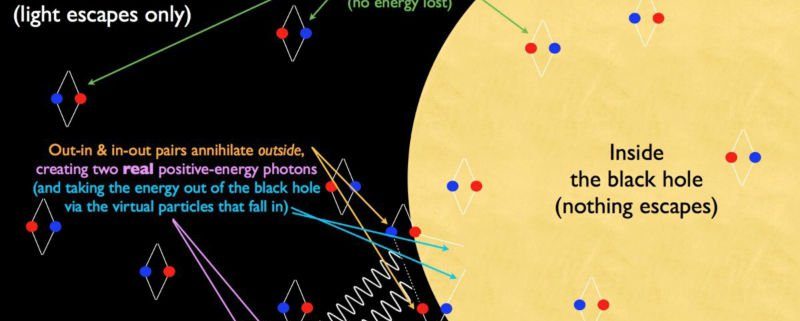Black holes can actually lose mass. Stephen Hawking theorized in 1974 that black holes radiate small numbers of particles (mainly photons), a process known as “Hawking Radiation”. This “evaporation” process can lead the black hole to shrink over time and ultimately to vanish completely. However, it is a staggeringly slow process: it would take about 10^67 years for a black hole the mass of the Sun to evaporate, significantly longer than the 14 billion years the Universe has existed.
You are here: Home / Black Holes Eventually Evaporate Over Time / Did you know that / Black Holes Eventually Evaporate Over Time

Department of Astrophysics,
IMAPP, Radboud University,
P.O. Box 9010,
6500 GL Nijmegen, The Netherlands

Institute for Theoretical Physics (ITP),
Goethe University,
Max-von-Laue-Str. 1,
Frankfurt, Germany

Max-Planck-Institut für Radioastronomie (MPIfR),
Auf dem Hügel 69, D-53121
Bonn, Germany
Other Partnerships
-Institut de Radioastronomie Millimétrique (IRAM)
-European Research Council (ERC)
-Joint Institute for VLBI ERIC (JIVE)
-European Organisation for Astronomical Research in the Southern Hemisphere (ESO)
-Max-Planck-Institut für extraterrestrische Physik (MPE, Garching)
-Observatoire de Paris
-Event Horizon Telescope
-European Research Council (ERC)
-Joint Institute for VLBI ERIC (JIVE)
-European Organisation for Astronomical Research in the Southern Hemisphere (ESO)
-Max-Planck-Institut für extraterrestrische Physik (MPE, Garching)
-Observatoire de Paris
-Event Horizon Telescope
Follow us!

 A Person Falling Into A Black Hole Would Be Spaghettified
A Person Falling Into A Black Hole Would Be Spaghettified 
